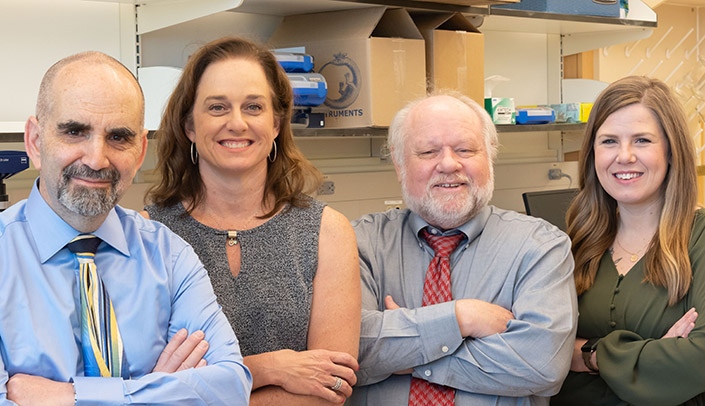A team of researchers at UNMC, working with Partner Therapeutics of Lexington, Massachusetts, has completed a proof-of-concept 12-month study demonstrating that Leukine® (rhuGM-CSF, sargramostim) treatment for Parkinson’s disease is well-tolerated and safe. Disease signs and symptoms proved stable and secondary drug-related toxicities were near absent.
The results were published in EBioMedicine, a leading Lancet open access journal that bridges the gap between basic and clinical research.
The data proved promising, so that the study was expanded to 24 months and had enrolled additional subjects in the extended study.
“The clinical paper studied a first-generation drug, where disease progression was altered and the drug safely administered for one year,” said Howard Gendelman, MD, chair of the UNMC Pharmacology and Experimental Neurology (PEN) and one of the lead researchers. However, he cautions that additional research is required in a larger clinical study before definitive conclusions can be made for drug effectiveness.
The UNMC research team, including Katherine Olson, PhD, R. Lee Mosley, PhD, and Pamela Santamaria, MD, completed their first clinical trial with the drug in 2016. In this first trial, participants received a dose of 250-microgram/mm2 Leukine per day, or placebo for 56 days. Patients treated with Leukine showed improvement in motor function compared to placebo. Before moving to a larger study, the researchers were charged to determine whether a lower dose of the drug would improve the safety profile while maintaining efficacy over extended time periods. The just-completed study followed five patients over the course of 12 months — all patients received the lower dose.
“The dose was adjusted to 125-microgram/mm2 with a five-day-on, two-day-off regimen. This was half of the previous dosage — and the patients were able to tolerate this quite well,” Dr. Santamaria said. “There was essentially no toxicity at this dosage, which was a major improvement from our prior investigation.”
This was yet one step in the final goal of an effective treatment for Parkinson’s disease, which the team has been working on for two decades.
Importantly, the improved motor function seen at higher doses was retained, with patients scoring, on average, better on standard Parkinson’s mobility tests (Unified Parkinson’s Disease Rating Scale Part III) during the study. The subjects improved by an average of four points on the test, while with standard treatment Parkinson’s patients typically worsen by 2.5 points over the same time period. When the decision to extend the trial was made, all of the original subjects elected to remain on the drug regimen.
“Treatments for Parkinson’s disease, such as dopamine replacement therapy, treat the symptoms, not the disease,” Dr. Santamaria said. “After a year of treatment in this study, none of our patients progressed.”
Additionally, improvement of peripheral immune dysfunction was seen, with increased numbers and function of Treg cells (which regulate other cells in the immune system). Researchers also discovered a spectrum of new blood tests that can monitor disease.
Notably, this study discovered a transformative biomarker for this medicine during long-term therapy. All elements of the immune system were engaged in potentiating brain homeostasis. “These tests served to balance active immune clearance responses while at the same time mitigating inflammation to affect disease progression,” Dr. Gendelman said.
Robert Eisenberg has taken part in the recent study with the Parkinson’s team and has been taking Leukine for more than two years.
“When I started on the medicine, I was having trouble walking and was rapidly declining,” he said. “Since I began, my score on the Unified Parkinson’s Scale has improved. I’m actually better.
“In layman’s terms, problems such as stiffness, walking properly, trouble getting up from a chair — all of these have been much alleviated,” said Mr. Eisenberg.
Another study participant, a male in his late 50s who was diagnosed seven years ago, said the progression of his disease had been arrested during the 24 months he spent in the trial.
“My decline, which I’ve been told is inevitable with the condition, basically leveled off,” he said.
The participant said it was important to him to assist researchers as they worked to identify an effective treatment for Parkinson’s disease.
The investigators were encouraged by the results of the study. “The next step,” Dr. Mosley said, “is a full, Phase II, placebo-controlled multisite study.”
“The treatment appears to be reducing neurodegeneration and inflammation, which is associated with deterioration, in the study’s patients,” said John McManus, Chief Business Officer of Partners Therapeutics. “Most importantly, that is translating into improvement in motor function.”
Leukine® is an FDA-approved, yeast-derived recombinant human granulocyte-macrophage colony stimulating factor (rhu GM-CSF). GM-CSF is a naturally occurring protein called a cytokine that plays an important role in myeloid hematopoiesis, immunomodulation and cell reprogramming.
“The industry is in a pharmaceutical revolution in terms of the treatment of Parkinson’s and Alzheimer’s immunologically,” Dr. Mosley said. “We’ve been exploring this treatment for more than a decade, and this proof-of-concept study is an exciting step as we work to control the effects of Parkinson’s disease and improve people’s lives.”

Another great breakthrough from the pharmacology and experimental neuroscience department. Congratulations to all.
Congratulations to ALL!
Awesome! Congrats on another step forward,
.
Congratulations
Great work, Congratulations!
Great clinical work. Many congratulations.
Congratulations Parkinson's team! Your persistence is paying off and making a difference in so many lives. Good luck in the next steps. Exciting times ahead! Robin Taylor
This is a fantastic result for this project. All the long hours and study are bearing fruit that will further the knowledge and help mankind to live better lives. So encouraging and a true validation of the value of science.